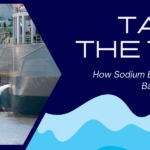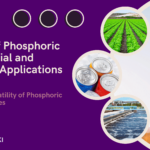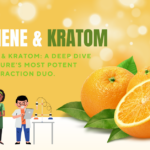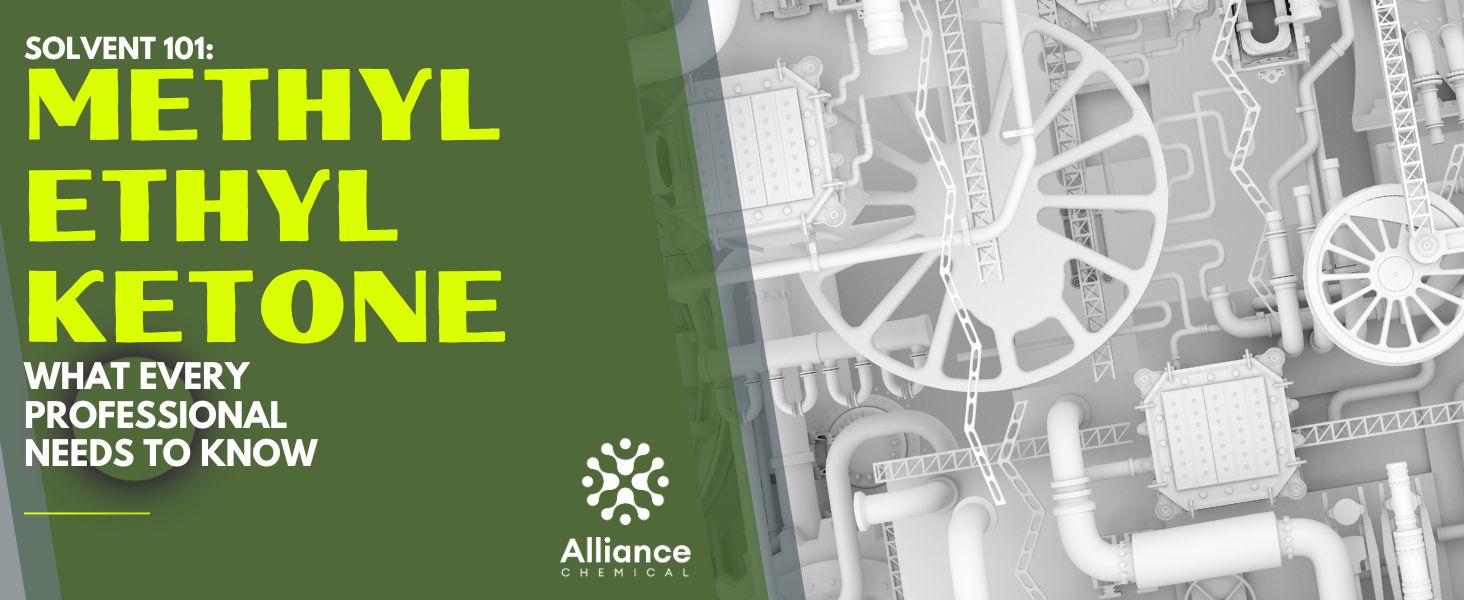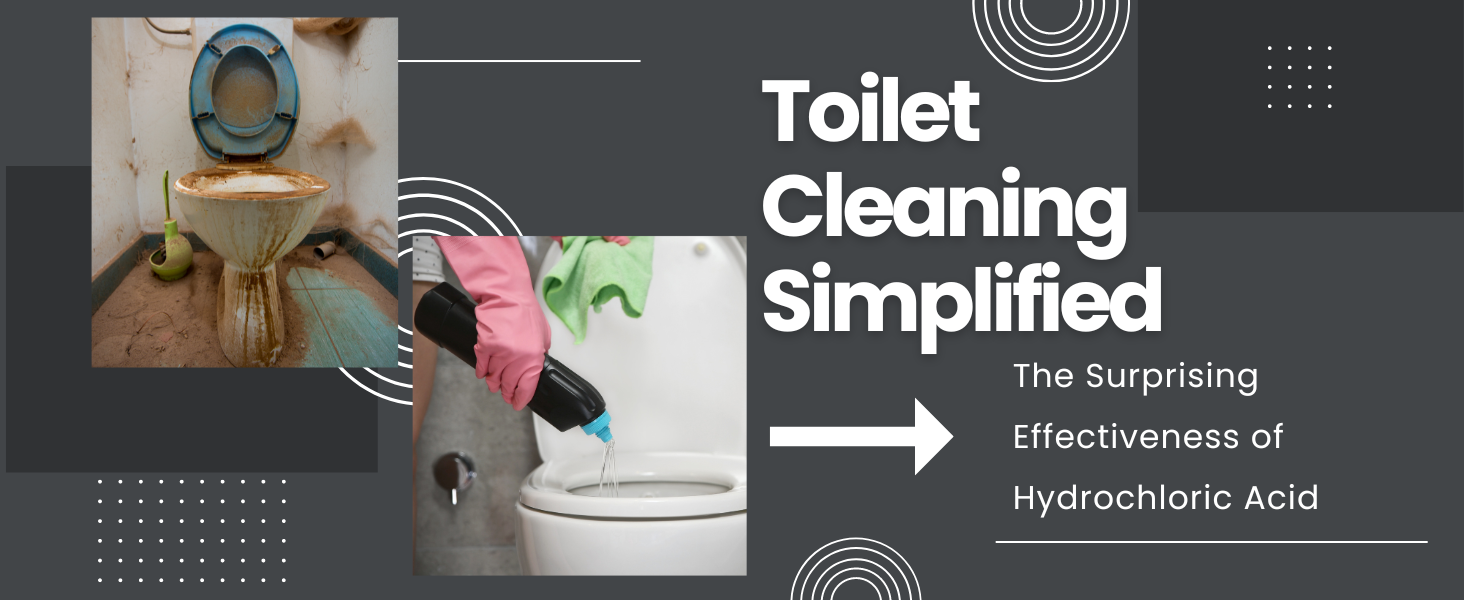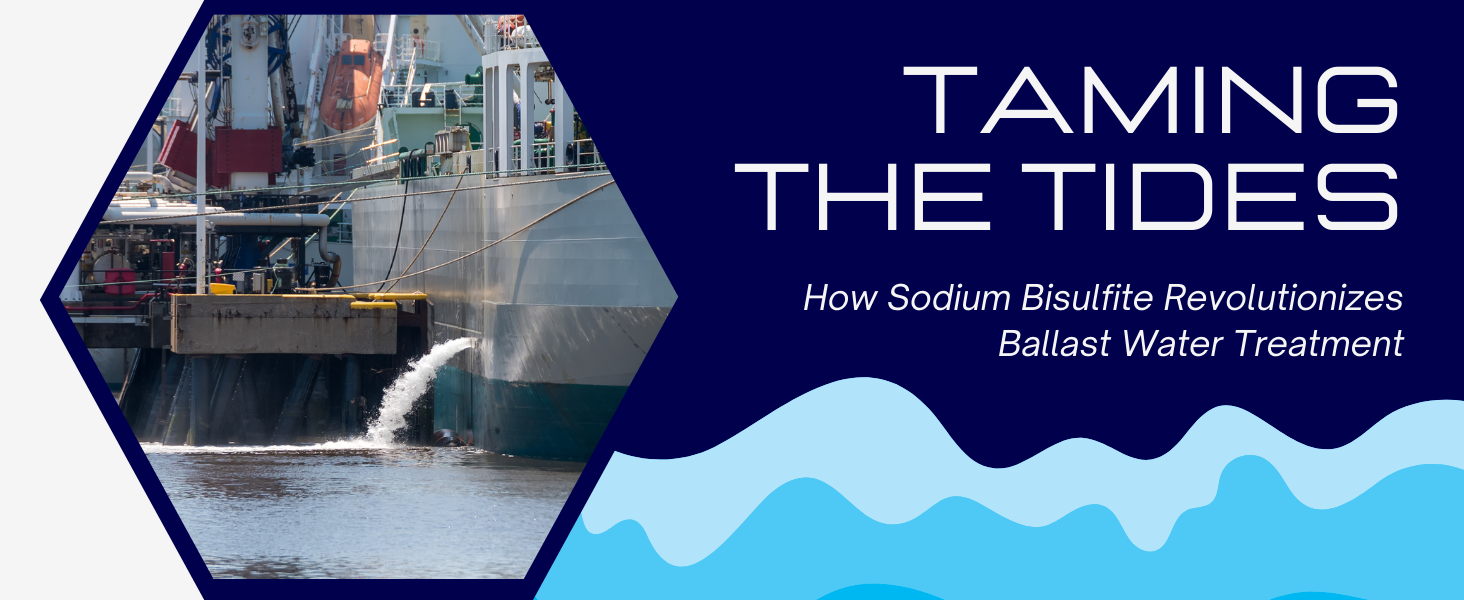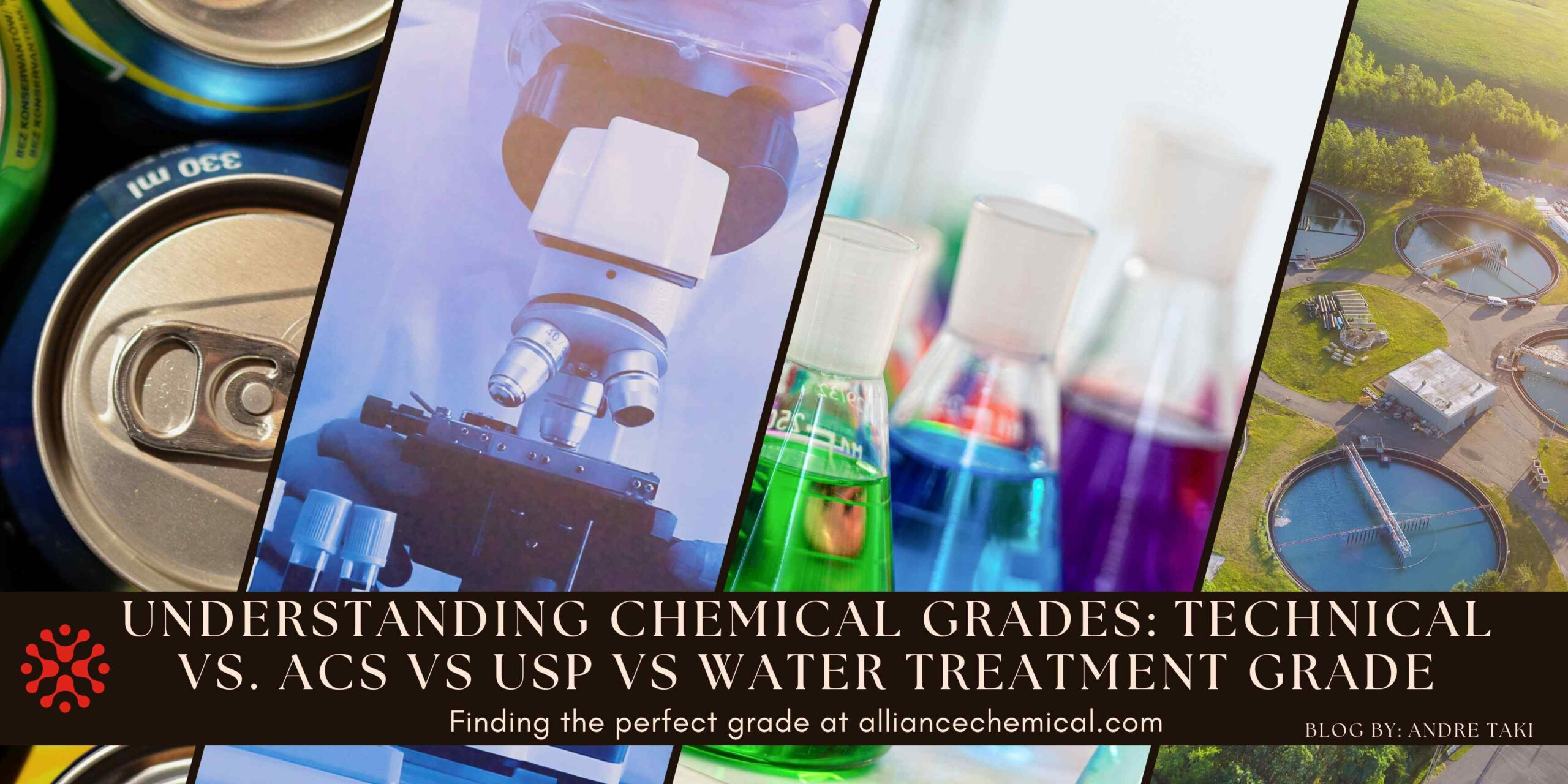
Understanding Chemical Grades: Technical Vs. ACS Vs USP Vs Water Treatment Grade
In the world of chemistry and industrial production, the purity and standards of chemicals used are of paramount importance. These standards define the grades of chemicals, which can significantly impact the outcome of various applications, whether it’s in a research laboratory, pharmaceutical development, or water treatment process. The most commonly known chemical grades are Technical, ACS, USP, and Water Treatment Grade. This article aims to provide an in-depth understanding of these grades, their unique attributes, and their specific uses.
Defining Chemical Grades
Technical Grade
Technical Grade chemicals are typically utilized in large-scale industrial operations. These chemicals have not been purified to the extent that they are suitable for food, drug, or medicinal use, but are still of sufficiently high quality for industrial use. For instance, our Technical Grade Propylene Glycol and Hydrochloric Acid 20°Be are ideal for industrial applications where a high degree of purity is not required.
-
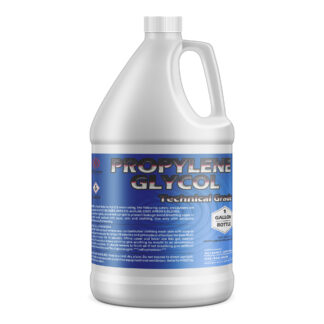 Propylene Glycol Technical Grade$23.00 – $4,875.00
Propylene Glycol Technical Grade$23.00 – $4,875.00 -
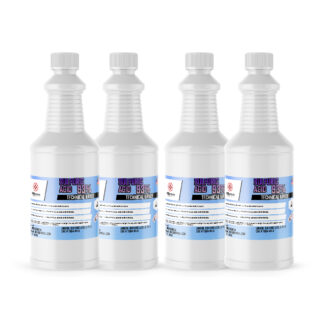 Sulfuric Acid 93% Technical Grade$38.00 – $6,075.00
Sulfuric Acid 93% Technical Grade$38.00 – $6,075.00 -
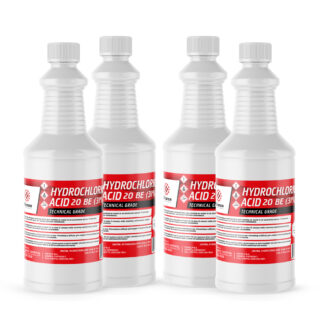 Hydrochloric Acid 31% Technical Grade$22.00 – $5,022.00
Hydrochloric Acid 31% Technical Grade$22.00 – $5,022.00 -
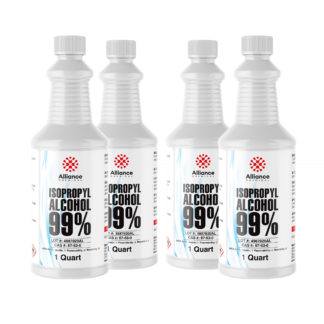 Isopropyl Alcohol 99%$19.00 – $3,500.00
Isopropyl Alcohol 99%$19.00 – $3,500.00
ACS Grade
ACS grade chemicals adhere to the standards set by the American Chemical Society (ACS). The ACS grade signifies that the chemical meets the minimum purity standards set by the ACS. These chemicals are typically used in research and analytical applications. For instance, our ACS Grade Hexane and Hydrochloric Acid 37% are popular choices for use in laboratories and research environments due to their high purity.
-
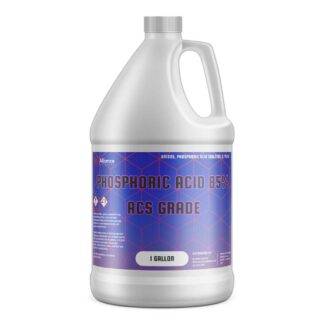 Phosphoric Acid 85% ACS Grade$31.00 – $6,480.00
Phosphoric Acid 85% ACS Grade$31.00 – $6,480.00 -
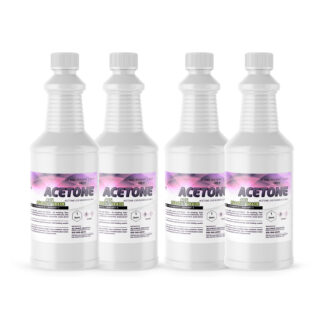 Acetone ACS Grade$36.00 – $4,500.00
Acetone ACS Grade$36.00 – $4,500.00 -
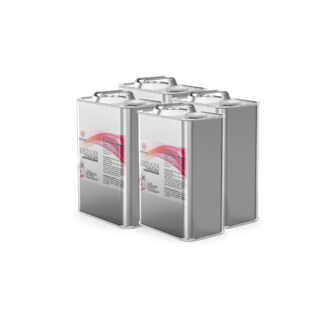 Hexane ACS Reagent Grade$38.00 – $8,640.00
Hexane ACS Reagent Grade$38.00 – $8,640.00 -
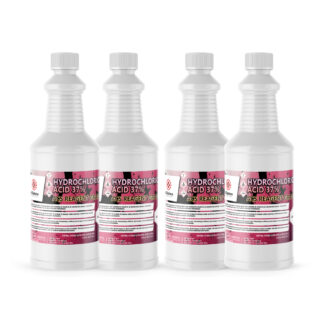 Hydrochloric Acid 37% ACS Reagent Grade$28.00 – $7,290.00
Hydrochloric Acid 37% ACS Reagent Grade$28.00 – $7,290.00
USP Grade
USP, or United States Pharmacopeia, grade chemicals comply with the standards of the United States Pharmacopeia and National Formulary (USP-NF). USP Grade chemicals are fit for use in food, drugs, and medicines. They are subject to stringent testing and are typically required to have the highest level of purity. For example, Isopropyl Alcohol 70% USP is a prime example of a chemical that can be safely used in pharmaceutical applications due to its high purity.
-
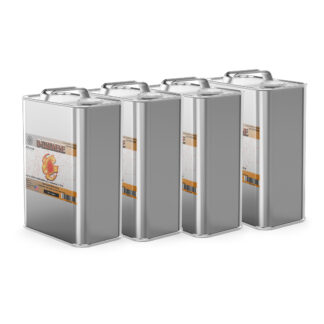 D-Limonene Food Grade$43.00 – $11,800.00
D-Limonene Food Grade$43.00 – $11,800.00 -
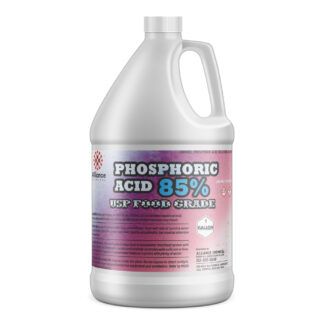 Phosphoric Acid 85% USP Food Grade$25.00 – $6,615.00
Phosphoric Acid 85% USP Food Grade$25.00 – $6,615.00 -
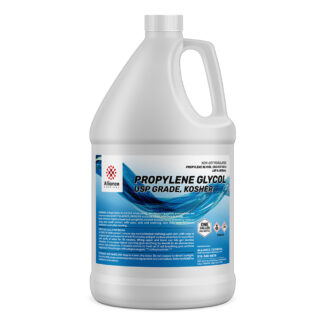 Propylene Glycol USP Grade$28.00 – $6,400.00
Propylene Glycol USP Grade$28.00 – $6,400.00 -
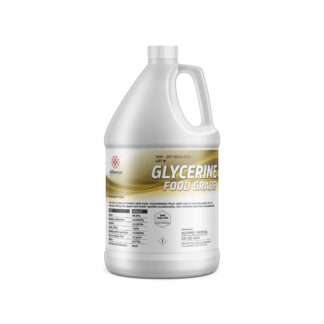 Glycerin USP Grade$29.00 – $4,700.00
Glycerin USP Grade$29.00 – $4,700.00 -
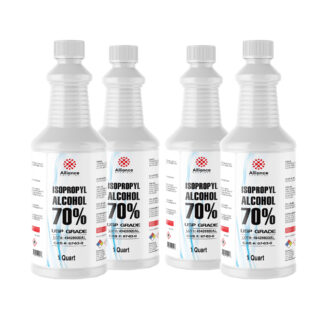 Isopropyl Alcohol 70% USP Grade$25.00 – $3,700.00
Isopropyl Alcohol 70% USP Grade$25.00 – $3,700.00
Water Treatment Grade
Water treatment grade chemicals are specifically designed for applications involving the treatment of water. These chemicals meet the standards required for safe and effective water treatment, ensuring that the treated water is safe for its intended use. Our Sodium Hypochlorite 12.5% is an example of a Water Treatment Grade chemical that is commonly used in disinfection and sanitation processes in water treatment facilities.
-
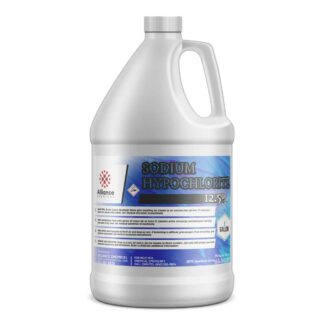 Sodium Hypochlorite 12.5%$22.00 – $2,646.00
Sodium Hypochlorite 12.5%$22.00 – $2,646.00 -
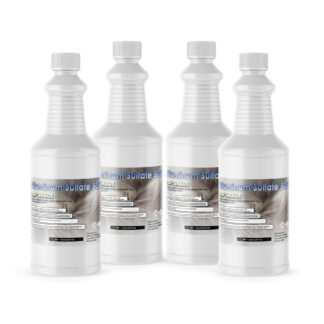 Aluminum Sulfate 50%$25.00 – $4,536.00
Aluminum Sulfate 50%$25.00 – $4,536.00
Understanding the Difference Between Chemical Grades
Different chemical grades exist due to varying purity levels, intended uses, and regulatory standards. The selection of the right chemical grade is crucial depending on its intended use. Using a lower purity grade chemical where a higher purity is needed can lead to inaccurate results or even dangerous situations in some cases. Conversely, using a high-purity chemical where it’s not needed can lead to unnecessary expense.
For instance, in a research setting, a scientist might require ACS grade chemicals like our 99.9% Isopropyl Alcohol ACS to ensure accuracy and reliability in their experimental results. In contrast, for industrial applications, technical grade chemicals, such as our 99% Isopropyl Alcohol Technical might be more appropriate and cost-effective.
In pharmaceutical production, chemicals must adhere to the stringent requirements set forth by the United States Pharmacopeia. Here, our Isopropyl Alcohol 70% USP could be utilized. This high-purity grade is safe for use in medicines, food products, and other applications that may come into contact with the human body.
Meanwhile, in water treatment processes, the use of water treatment grade chemicals is a necessity. Here, our Sodium Hypochlorite 12.5% water treatment grade comes into play. This chemical ensures the effective treatment of water, making it safe for consumption or other uses.
Choosing the Right Grade
When choosing the right chemical grade, consider factors like the application, required purity, and the budget. For example, in an industrial setting, where large volumes of chemicals are used, technical grade might be a more suitable and budget-friendly option. However, in a pharmaceutical setting, where health and safety are paramount, USP grade would be the best choice despite the higher cost.
Moreover, compliance with local and federal regulations is another vital consideration. Different industries have different regulations regarding the types of chemical grades that can be used. For instance, in the food and drug industry, it is mandatory to use USP grade chemicals. Similarly, in the water treatment industry, the use of water treatment grade chemicals is required to ensure the treated water is safe for consumption.
Conclusion
The world of chemical grades can initially seem complex, but understanding the differences between Technical, ACS, USP, and Water Treatment grades can help you make an informed decision about the best chemical product for your specific needs. Always remember to check the product’s chemical grade and its corresponding standards to ensure it is the right fit for your intended application.
Choosing the right chemical grade is not just about meeting regulatory standards, but also about optimizing results, ensuring safety, and making economical choices. Whether you’re an industrial worker, a researcher, a pharmacist, or involved in water treatment, understanding chemical grades is fundamental to the success of your work. By understanding the different chemical grades, you are well equipped to choose the most suitable chemicals for your specific applications, ensuring safety, efficiency, and cost-effectiveness.





